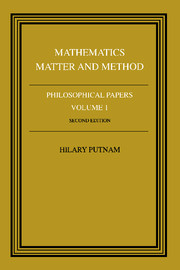Book contents
- Frontmatter
- Contents
- Dedication
- Introduction
- 1 Truth and necessity in mathematics
- 2 The thesis that mathematics is logic
- 3 Mathematics without foundations
- 4 What is mathematical truth?
- 5 Philosophy of physics
- 6 An examination of Grünbaum's philosophy of geometry
- 7 A philosopher looks at quantum mechanics
- 8 Discussion: comments on comments on comments: a reply to Margenau and Wigner
- 9 Three-valued logic
- 10 The logic of quantum mechanics
- 11 Time and physical geometry
- 12 Memo on ‘conventionalism’
- 13 What theories are not
- 14 Craig's theorem
- 15 It ain't necessarily so
- 16 The ‘corroboration’ of theories
- 17 ‘Degree of confirmation’ and inductive logic
- 18 Probability and confirmation
- 19 On properties
- 20 Philosophy of Logic
- Bibliography
- Index
- Frontmatter
- Contents
- Dedication
- Introduction
- 1 Truth and necessity in mathematics
- 2 The thesis that mathematics is logic
- 3 Mathematics without foundations
- 4 What is mathematical truth?
- 5 Philosophy of physics
- 6 An examination of Grünbaum's philosophy of geometry
- 7 A philosopher looks at quantum mechanics
- 8 Discussion: comments on comments on comments: a reply to Margenau and Wigner
- 9 Three-valued logic
- 10 The logic of quantum mechanics
- 11 Time and physical geometry
- 12 Memo on ‘conventionalism’
- 13 What theories are not
- 14 Craig's theorem
- 15 It ain't necessarily so
- 16 The ‘corroboration’ of theories
- 17 ‘Degree of confirmation’ and inductive logic
- 18 Probability and confirmation
- 19 On properties
- 20 Philosophy of Logic
- Bibliography
- Index
Summary
Craig's observation
‘Craig's theorem’ (Craig, 1953), as philosophers call it, is actually a corollary to an observation. The observation is that (I) Every theory that admits a recursively enumerable set of axioms can be recursively axiomatized.
Some explanations are in order here: (1) A theory is an infinite set of wffs (well-formed formulas) which is closed under the usual rules of deduction. One way of giving a theory T is to specify a set of sentences S(called the axioms of T) and to define T to consist of the sentences S together with all sentences that can be derived from (one or more) sentences in S by means of logic. (2) If T is a theory with axioms S, and S' is a subset of T such that every member of S can be deduced from sentences in S', then S' is called an alternative set of axioms for T. Every theory admits of infinitely many alternative axiomatizations – including the trivial axiomatization, in which every member of T is taken as an axiom (i.e. S = T). (3) A set S is called recursive if and only if it is decidable – i.e. there exists an effective procedure for telling whether or not an arbitrary wff belongs to S. (This is not the mathematical definition of ‘recursive’, of course, but the intuitive concept which the mathematical definition captures.) For ‘effective procedure’ one can also write ‘Turing machine’ (cf. Davis, 1958.).
Information
- Type
- Chapter
- Information
- Mathematics, Matter and MethodPhilosophical Papers, pp. 228 - 236Publisher: Cambridge University PressPrint publication year: 1979
